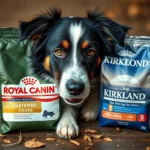
Introduction
Dog nutrition is a vital aspect of pet care that ensures our furry friends live healthy and active lives. A balanced diet for dogs typically includes proteins, fats, carbohydrates, vitamins, and minerals, all of which contribute to their overall well-being. Many dog owners often look at different food ingredients to enhance their pets’ diets, and one common question arises: can dogs eat black beans?
In this article, we will delve into the nutritional value of black beans for dogs, assess their safety, and explore the benefits they might offer. We will also provide guidance on how to safely introduce black beans into your dog’s diet, alongside discussing alternatives and common misconceptions.
Understanding Canine Dietary Needs
Essential Nutrients for Dogs
To comprehend the role of black beans in a dog’s diet, it’s crucial to first understand the essential nutrients dogs require:
- Proteins: Vital for growth, muscle development, and overall health. Proteins are made up of amino acids, which are the building blocks for many bodily functions.
- Fats: They provide energy and are crucial for the absorption of certain vitamins. Healthy fats support skin and coat health, as well as brain function.
- Carbohydrates: While not essential, carbohydrates offer a quick energy source. They also provide fiber, which aids in digestion.
- Vitamins and Minerals: These micronutrients support numerous bodily functions, from bone health to immune function.
Common Dietary Restrictions
It’s also important to consider that some dogs may have dietary restrictions due to allergies, sensitivities, or specific health conditions. Common dietary issues include:
- Food allergies: Dogs can develop allergies to certain proteins or grains, leading to skin irritations or gastrointestinal problems.
- Health conditions: Conditions like diabetes, pancreatitis, or kidney disease may require specific dietary adjustments.
Overview of Black Beans
Nutritional Profile of Black Beans
Black beans, known for their rich flavor and creamy texture, are packed with nutrients that can be beneficial to both humans and dogs. Here’s a breakdown of their macronutrients:
- Proteins: Approximately 21 grams per cup, making them a good plant-based protein source.
- Fats: Low in fats, with about 0.9 grams per cup.
- Carbohydrates: Roughly 40 grams per cup, primarily from complex carbohydrates and fiber.
In addition to macronutrients, black beans also contain essential micronutrients, including:
- Iron
- Magnesium
- Folate
- Potassium
Health Benefits of Black Beans for Humans
While this article focuses on canine nutrition, it’s worth noting the health benefits of black beans for humans as well, which often translate to potential benefits for dogs:
- High Fiber Content: Promotes digestive health and can help regulate blood sugar levels.
- Antioxidants and Phytochemicals: These compounds may help reduce inflammation and support overall health.
Can Dogs Eat Black Beans?
Safety of Black Beans for Dogs
The central question remains: can dogs eat black beans? The answer is yes, but with caution.
Black beans are generally safe for dogs when prepared correctly. They offer a source of protein and fiber, but there are potential risks to consider:
- Gas and Digestive Issues: Beans, including black beans, can cause gas and bloating in dogs. This is due to their high fiber content and certain sugars that can be difficult for dogs to digest.
- Raw Beans: It is essential never to feed raw beans to dogs, as they contain toxins that can be harmful. Cooking black beans eliminates these toxins and makes them safe for consumption.
Potential Health Benefits
When fed in moderation, black beans can provide various health benefits for dogs:
- Protein Source: While meat is the primary protein source for dogs, black beans can supplement their diet, especially for vegetarian or grain-free diets.
- Fiber for Digestion: The fiber in black beans can help promote healthy digestion and regular bowel movements.
- Micronutrients: The minerals found in black beans, such as magnesium and potassium, support various bodily functions, including muscle and nerve function.
How to Safely Introduce Black Beans to Your Dog
Preparation Methods
If you decide to incorporate black beans into your dog’s diet, preparation is key:
- Cooking Black Beans: Always cook black beans thoroughly. This not only makes them safe but also easier for your dog to digest.
- Avoiding Seasoning and Additives: When preparing black beans for your dog, avoid adding salt, spices, or other additives, as these can be harmful to dogs.
Serving Sizes
When introducing black beans, it’s essential to consider portion sizes:
- Recommended Portion Sizes: Start with a small amount, such as a tablespoon for small dogs and up to half a cup for larger dogs.
- Frequency of Feeding Black Beans: Black beans should not be a daily staple. Instead, offer them as an occasional treat or supplement to your dog’s regular diet.
Alternatives to Black Beans in Dog Diets
Other Safe Legumes for Dogs
If you’re looking for alternatives to black beans, several other legumes are safe for dogs:
- Lentils: High in protein and fiber, lentils can be a nutritious addition to your dog’s diet when cooked.
- Chickpeas: These provide protein and fiber but should be served in moderation to avoid digestive upset.
- Peas: Rich in vitamins and low in calories, peas can be included in your dog’s meals.
Grain-Free Diet Options
Grain-free diets are becoming increasingly popular among dog owners. Here are some benefits and alternative carbohydrate sources:
- Benefits of a Grain-Free Diet: Many dogs may benefit from a diet low in grains, particularly if they have sensitivities to wheat or corn.
- Alternative Carbohydrate Sources: Sweet potatoes, pumpkin, and quinoa can serve as excellent substitutes for grains, providing necessary nutrients without the potential allergens.
Common Misconceptions About Feeding Beans to Dogs
Beans and Dog Allergies
One common myth is that beans can cause allergies in dogs. While any food can potentially trigger an allergic reaction, beans are not among the most common allergens for dogs.
Beans as a Complete Meal Source
Another misconception is that beans can serve as a complete meal for dogs. While black beans provide many nutrients, they cannot replace a balanced diet. Dogs require a variety of foods to meet their nutritional needs.
Consulting with Your Veterinarian
When to Seek Professional Advice
Before introducing any new food into your dog’s diet, it’s wise to consult with your veterinarian, especially if your dog has existing health conditions. Signs that you should seek professional advice include:
- Signs of Allergies or Digestive Issues: Watch for symptoms like itching, vomiting, or diarrhea after introducing black beans.
Tailoring Diet to Specific Dog Needs
Every dog is unique, and their dietary needs can vary based on several factors, including:
- Age: Puppies, adults, and senior dogs have different nutritional requirements.
- Size: A small dog will have different portion needs than a large breed.
- Activity Level: Active dogs may require more protein and calories than less active ones.
Conclusion
In summary, can dogs eat black beans? Yes, they can, provided they are cooked and given in moderation. Black beans can serve as a supplementary protein and fiber source, supporting your dog’s overall health when included as part of a balanced diet. However, it’s crucial to consider your dog’s individual needs and consult with a veterinarian before making any significant dietary changes.
Encouraging a diverse diet rich in various nutrients will help ensure your furry friend remains healthy and happy. Always prioritize moderation and variety in your dog’s diet, and don’t hesitate to seek professional guidance for personalized advice.
FAQs
-
Can dogs eat black beans every day?
No, black beans should only be offered occasionally, as they can cause digestive issues if overfed. -
What should I do if my dog shows signs of discomfort after eating black beans?
If your dog experiences any discomfort, such as gas or vomiting, discontinue feeding black beans and consult your veterinarian. -
Are there any beans that are toxic to dogs?
Yes, raw kidney beans are toxic to dogs and should never be fed. Always ensure beans are properly cooked before serving them to your pet.









